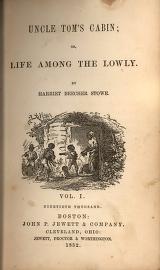
Harriet Beecher Stowe
(1811-1896)
Harriet Beecher was born in Litchfield, Connecticut. Her father, Lyman Beecher, was a strict Calvinist minister. Harriet's mother died when she was four. In 1832, her father was named director of Lane Theological Seminary in Cincinnati, Ohio. The family relocated there, and her older sister Catherine opened the Western Female Institute, where Harriet taught. Harriet began writing fiction, and in 1834 won a fifty dollar prize for her story "A New England Sketch." Her writing career was temporarily delayed when she married Calvin Ellis Stowe, a professor at Lane Seminary. They had seven children. During that time she traveled in the South, particularly in neighboring Kentucky, a slave state. She resumed her writing and in 1843 her first book, "The Mayflower," a collection of previously-published sketches about the Pilgrims' descendants, was published. In 1850 Calvin was offered a chair at Bowdoin College in Brunswick, Maine, and it was there that Harriet began her novel "Uncle Tom's Cabin; or, Life Among the Lowly," which galvanized Northern public opinion against the institution of slavery. The novel first appeared in installments in "National Era," an antislavery newspaper, and was published as a book in 1852. In its first year, it sold 300,000 copies, and another 200,000 over the next four years. Although the book was clearly popular, the press almost uniformly panned it, especially in the South. To answer her many critics, in 1853 Stowe published "A Key to Uncle Tom's Cabin," a set of documents verifying many of the book's details. In 1856 she published "Dred: A Tale of the Great Dismal Swamp," which also sold well. That was her last novel on slavery. Stowe returned to New England themes, writing books such as "Oldtown Folks" (1869), a picture of life and diverging religious beliefs in a Massachusetts village before the advent of railroads. Harriet Beecher Stowe's later writings continued to sell steadily.